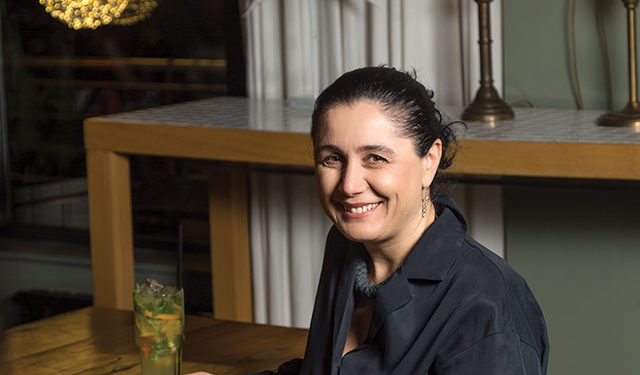Clinic “Inova Invitro” appeared on the Georgian market more than 5 years ago, and during this time was able to easily gain the public’s trust by offering them high quality service. The clinic primarily deals with gynecology and fertility issues, and, over the years, it has earned a reputation as a highly qualified, well-organized clinic tailored to the individual needs of patients. Ketevan Osidze, Head of Inova Invitro, Reproductologist, Obstetrician-Gynecologist, tells us about the main advantages of the clinic, important news in the field, and other interesting topics.
“We are in collaboration with the world leader in our field – the Valencian Institute for Infertility IVI. This contract guarantees that we have specialists with the highest qualifications and results in the embryology laboratory,” Dr. Osidze says. “For their specialist, Hector Huete Ferriz, Georgia is practically a second homeland. Although Georgian embryologists have already established themselves as trusted specialists, Hector is happy to continue to participate in the development of our clinic. Moreover, in our country, patient appreciation for personal work is often seen and is big pleasure to receive it. Several couples are already planning to have a second and third child thanks to his work. It might sound funny to you, but one of the cutest girls told us that she’s going to name her second child Hector. The first, of course, was named after her father-in-law. This young woman is now again pregnant and we are waiting for her second child to be born a girl or a boy.”
What are the main advantages of the clinic?
Most of our services are costly, complicated procedures, and the patient along with the authority of the clinic must have the belief of the doctor and embryologist that this fine process will be done professionally and with maximum transparency what will ensure minimal stress for them. Our priority is to make the patient fully aware of possible outcomes, modifications and capabilities. With the knowledge and experience of doctors, the professionalism and diligence of the embryology team is a key prerequisite for our success.
It is our greatest comfort and pleasure to be able to follow the innovations of our own field and introduce any new method. With so much innovations, genetic research is especially evolving. For the fourth year we are successfully completing one of the most difficult procedures: PGT-A and PGT M – studies of embryos. In addition to the theoretical aspects, the delicate performance of embryological procedures is very important. The possibilities of this method are irreplaceable for those who need it; however, the evaluation of indications and the pragmatic necessity in relation to price are not unequivocal and the experience of the physician fully determines the recommendations. The possibility of screening non-invasive embryos for aneuploidy – a procedure that is in the final stages of approbation and introduction to the clinic – would be a methodological step forward for good outcomes.
Tell us about novelties in the field.
It is especially important to refine the freezing methods of biological material – gametes and cells. The introduction of the so-called vitrification method into practice has led to a dramatic increase in the efficiency of in vitro procedures, while allowing us to virtually eliminate the most dangerous complication – hyperstimulation syndrome. Unfortunately, career plans and various social factors cause a woman to face infertility due to a decrease in ovarian reserve and chances of pregnancy. As a way out of the situation, timely vitrification of the gametes – eggs has its role. I would like to take this moment and urge women to apply this method in a timely manner as well, since at a more advanced age, the effectiveness is really drastically reduced. Freezing is also very helpful before large-scale gynecological surgeries – despite the reduction in ovarian reserve after surgery, consecutive frozen-warmed embryo transfer (FET) is still very effective.
As we know, freezing methods are also needed for oncology patients.
A separate niche in the use of cryo technologies is to maintain reproductive potential for cancer patients of both sexes. It is gratifying that our colleagues – oncologists, surgeons, hematologists – are increasingly referring patients to us. The fact is that often, after courses of chemotherapy or radiotherapy, irreversible changes develop in the ovarian and testicular tissue and the patient may become sterile. Unfortunately, one study found that only 32% of cancer patients were aware of the damaging effects of chemotherapy and the presence of vitrification methods. I think journalism should play its role in disseminating this information. In my opinion, it is necessary for the state to be involved in these processes and to allocate partial funding for the given needs of this most complicated contingent.
What do you think is the key to the clinic’s success?
I think the in vitro fertilization department is our uniquely strong side. I am happy to share the accumulated experience with new specialists. After outpatient treatment, sometimes the only way is IVF – In Vitro Fertilization, and the patient’s greatest comfort if he or she continues treatment in the hands of personal doctor. Detailed knowledge and analysis of the patient’s diagnosis, anamnesis is the key to success. In general, our field deals with such a sensitive topic that it implies a long-term and trusting relationship between the patient and the doctor. We are very grateful to the patients who trust us and follow us in their treatment.
As we know, pregnancy is also managed in the clinic …
Alongside other routine gynecological procedures, I especially like to single out pregnancy management. If the pregnancy of a difficult patient (pregnancy after infertility, pregnant women over the age of 46, women who underwent spontaneous abortions) requires specific management and prevention of complications, in general a pregnant woman without complications should be offered the minimum necessary services. The strongest ultrasound department and well-maintained laboratory services allow our obstetricians to protect pregnant women against pregnancy complications.
What would you say to the ladies?
I urge women to take prophylactic studies. Pap tests, gynecological examinations and breast ultrasounds must be performed at certain intervals – often in case of pathology, and in case of normal condition – at least once every two years. Fertility issues should be priority and timely planned pregnancy is much better decision then carrier growth or all other reasons. Solving the problems detected timely is easier and ensures a much higher quality of life. I wish you all good health!














